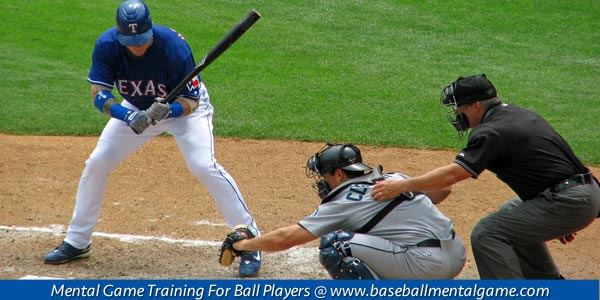The Mental Game of Hitting
I once knew a hitter named Soft Hands…
Soft Hands was a great hitter, who brimmed with confidence when the ball bounded squarely off the center of his bat. He had touch, confidence, and fed off momentum.
When Soft Hands got his first hit of the day, he felt like he could not miss all day. He would hit great that day.
If Soft Hands did not get a hit, he knew that the next at bat would be successful.
He would say to himself:
“It’s OK because I know I will do well the next time”.
He had a rational side that knew you can’t get a hit every time and he didn’t let a ground out or pop out effect his hitting confidence or other parts of his game. Good hitting helped him relax, which improved the rest of the game. He hit great and didn’t worry about mistakes because he knew that mistakes were only temporary.
In the end, Soft Hands won games.
I also knew a hitter called Death Grip…
Death Grip was not a great hitter like Soft Hands. When Death Grip strikes out early in the game, he talked himself into hitting poorly all day. His grip got even tighter. He became more anxious and hit worse. He lost his confidence, touch, and had negative momentum on his side.
Death Grip, unlike Soft Hands, had an irrational side to him. When he popped out early he would say to himself: “Here we go again, hitting poorly again.”
He would reinforce this thinking by maintaining irrational thoughts like:
“It’s so awful that I can’t hit well all the time, I’ll never be a great hitter.”
Death Grip’s frustration with hitting made him make poor decisions, get tense the whole day, and not enjoy baseball. His frustration filtered into the rest of his game and made him make errors on defense, which further eroded confidence. He was angry at baseball.
In the end Death Grip’s hitting caused him to burnout, be depressed, and not enjoy the game he loved to play.
The ironic part of the story is that Soft Hands and Death Grip were the same person living in conflict together, and battling for supremacy.
The moral of the story is that humans have two sides to their personality.
To be successful and be happy in life, the rational side must prevail.
Related Sports Psychology Articles
- 6 Common Mental Game Errors For Hitters
- Two Types of Mindsets for Ball Players
- How Ball Players Can Stop Poor Thinking
*Subscribe to The Sports Psychology Podcast on iTunes
*Subscribe to The Sports Psychology Podcast on Spotify
Get the Mental Edge – With Mental Toughness Coaching
Mental toughness coaching helps serious athletes like you uncover the beliefs and attitudes that keep you from performing to your potential. You’ll learn mental game strategies to perform confidently in competition and how to overcome performance barriers.
You can improve your mental game with Mental Game Coaches, Dr. Patrick Cohn and Jaclyn Ellis, M.S. You can opt for one-on-one sessions with Dr. Cohn in Orlando, Florida, or you can stay where you are and get coaching from anywhere in the world via telephone, Skype, Zoom, or FaceTime.
One-on-one mental coaching is the fastest and most effective method to improve your mental game, boost your performance, and make lasting changes. We have a variety of mental coaching programs to choose from.
Please call us at 888-742-7225 with your questions.


Leave a Reply